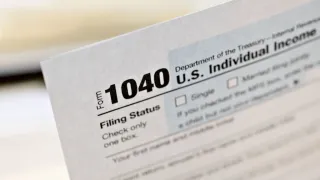
The new year is just days away, meaning it's time for Americans to gather their W-2's and prepare to file their federal and state income taxes.
From documents necessary to tax credit eligibility and best ways to file, here's everything to know about tax season in Illinois this year.
What documents do I need?
According to the Illinois Department of Revenue, here's a look at common documents that may be needed to file your state return:
- Adjusted Gross Income (AGI) from 2022 IL-1040,
- Copy of federal income tax return and schedules,
- Copies of all W-2 and 1099 forms,
- Property Number and amount of property taxes paid if claiming a property tax credit,
- Voluntary emergency worker credit certificate,
- Receipts for qualified education or moving expenses, and
- Routing and account number if due a refund and choose to deposit refund directly into checking or savings account.
What tax credits may I be eligible for?
A full list of available tax credits can be found here, with specific information on eligibility listed to each tax credit.
Local
The IDOR lists the Illinois Earned Income Tax Credit (IEITC), the Illinois K-12 Education Expense Credit and the Property Tax Credit among the most popular tax credits in the state.
According to the IDOR, the IEITC has been increased to 20% of the federal EITC and has been expanded to include individuals 18-25 years of age and older as well as individuals age 65 years and older who are without a qualifying child, and filing with an Individual Taxpayer Identification Number (ITIN) or have children with an ITIN.
Feeling out of the loop? We'll catch you up on the Chicago news you need to know. Sign up for the weekly Chicago Catch-Up newsletter.
How do I file?
Officials strongly recommend that residents file electronically, adding that it's both the most convenient way to file and ensures the fastest possible refund.
Residents can file without an account at Illinois' official website here, where those filing can also check on the status of their refund, make payments and respond to department inquiries.
Individuals may also file with a tax professional, tax-prep software or the paper Form IL-1040.
When will I get my refund?
Residents are encouraged to file as early as possible and to choose direct deposit to encourage a quick arrival of a refund.
Taxpayers who electronically file an error-free return should receive a direct deposit refund in approximately four weeks.
Taxpayers who receive notices from the IDOR are encouraged to respond as soon as possible to help expedite processing and minimize any potential delays.
What if I need more time?
While taxpayers are granted an automatic six-month extension to file an IL-1040 each year, those who owe money on their returns are still required to pay by April 15, 2024 to avoid taxes and interest.
If a return cannot be filed by the due date, taxpayers may make an extension payment electronically through MyTax Illinois.
Are there any changes taking effect this year?
Three changes to the Illinois tax filing process are taking effect this year, including:
- The 2023 personal exemption amount is $2,425.
- The original due date for filing the 2023 Form IL-1040 and paying the 2023 individual income tax liability is April 15, 2024.
- The extended due date for filing a return is October 15, 2024.



